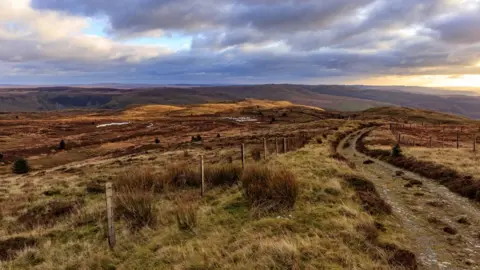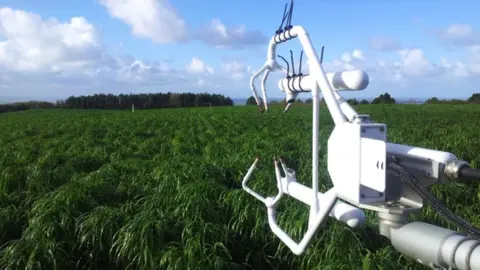Climate change: Aberystwyth University's role removing greenhouse gases
 Aberystwyth University
Aberystwyth UniversityCrops will be planted by Welsh scientists in an attempt to reduce greenhouse gases.
Willow and Miscanthus, which remove carbon dioxide from the environment, will be planted on land less suited to food production.
They can be harvested every one to three years.
Aberystwyth University scientists will lead partners in developing the biomass crops as part of a £30m UK government-funded project to help the climate.
Prof Iain Donnison, head of the Institute of Biological, Environmental & Rural Sciences (IBERS) at the university, said they would be using a range of technologies to plant the crops, as well as looking at incentives which may encourage farmers to grow these crops.
 Aberystwyth University
Aberystwyth UniversityRather than growing the crops and then burning them - which would release the carbon back into the atmosphere - they will be composted and used to make energy or construction materials.
"It's helping us to meet our targets as a society... but in addition provides opportunities for farmers to actually contribute to tackling climate change," Prof Donnison said.
It will also help to restore peatlands, which naturally absorb CO2, but many in the UK are in a poor condition and contributing to carbon emissions.
Prof Donnison said: "We've had loss of those peatlands, so loss of those habitats but most importantly loss of those big carbon sinks.
"It's about learning as we start to scale up these crops, and working on other technologies we can hopefully implement and actually improve the efficiency of these, while other less nature-based solutions are being worked on and will potentially come along towards the middle of this century.
"But it's really the next one or two decades we need to get a number of these technologies out there, implemented and being used."
The results will be used to shape longer-term government decision-making on the most effective technologies to help tackle climate change and reduce CO2 emissions in order to meet net zero carbon emissions by 2050.
